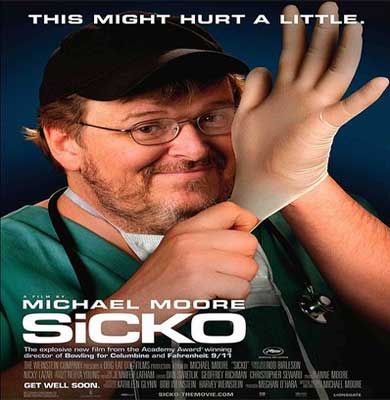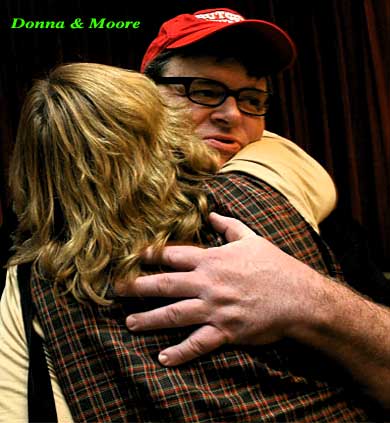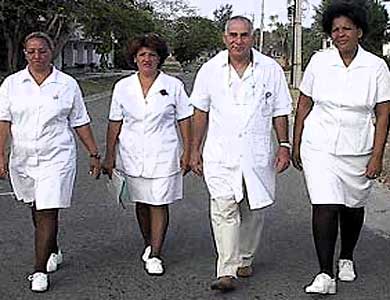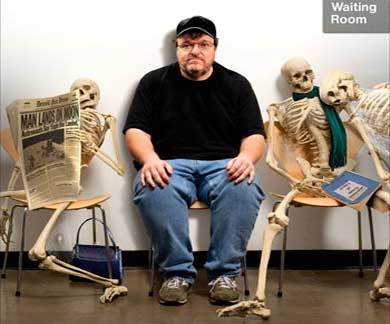En el marco del Foro Social de los Estados Unidos, realizado por primera vez en este país, en la ciudad de Atlanta se presentó el preestreno de la película SICKO, del director norteamericano Michael Moore que, al igual que en sus producciones anteriores («Bowling for Columbine» y «Fahrenheit 9/11»), desnuda el poderío económico de las grandes corporaciones en USA, en este caso el de las Aseguradoras Privadas de Salud.

Moore compara el sistema de salud en EE.UU. con los sistemas estatales en Canadá, Gran Bretaña, Francia y Cuba a través de impresionantes testimonios que, junto a la ironía y el humor característicos de las producciones de Moore, hacen de este documental una pieza que nadie debería dejarla pasar sin ver.
En la ceremonia de preestreno de Sicko logré esta entrevista con una de las personas cuyo caso es tratado en la película. Ella me puso una única "condición" para aceptarla: que le haga llegar sus saludos al pueblo de Cuba, con el cual ella afirma sentirse en deuda de por vida. Le prometí que así lo haría, a través de la Asamblea Permanente de Derechos Humanos y de la Embajada de Cuba en Ecuador.
FIDEL NARVÁEZ: ¿Por favor, me puedes dar tu nombre y decirnos de dónde vienes?
DONNA SMITH: Mi nombre es Donna Smith y vengo de Denver, Colorado, en los Estados Unidos.
FN: Donna, acabamos de ver el preestreno de esta película espectacular, el más reciente documental de Michael Moore (SICKO), tú has sido parte de ella, prácticamente el film comienza con tu caso y luego apareces también en la parte final. ¿Cómo Michael te contactó para la película?
DS: La verdad es que yo le escribí un e-mail a él hace como trece o catorce meses. Él hizo un llamado para receptar historias trágicas de atención a la salud. Un amigo me había dicho que él (Michael Moore) estaba haciendo un documental sobre la atención de salud.
Una noche, estaba sola y toda deprimida sobre mi situación de salud y entonces mandé un e-mail. Luego no recibí ninguna noticia por cerca de seis semanas, cuando recibí un e-mail de ellos (el equipo de producción) diciéndome que querían que hable con Michael Moore.
FN: Y entonces fuiste a entrevistarte con Michael Moore…
DS: Ellos me llamaron, los productores vinieron a vernos y les entregamos la primera documentación del caso.
Tú sabes... hay gente que critica a Michael Moore insinuando que tal vez no se basa en hechos reales, pero te juro que yo tuve que proveer mucha documentación y muchísima información de respaldo antes de que los productores fueran más adelante con mi caso.

FN: Antes de ver la película ¿sabías tú algo sobre los sistemas de atención de salud en otros países? En la película hemos visto acerca los sistemas de salud en Francia, en Inglaterra, en Canadá…
DS: Había escuchado algo principalmente sobre Canadá e Inglaterra, porque pienso que es sobre lo que los medios de noticias en Estados Unidos hablan y lo que escuchamos es que supuestamente ahí tu tienes que pasar por largas esperas para recibir atención y que el trato no es bueno… que esa gente debe pagar unos impuestos terribles… de manera que yo era como la mayoría de los norteamericanos, no sabía mucho sobre lo que otros países hacen.
FN: ¿Y sobre el sistema de salud en Cuba?
DS: No sabía nada sobre el sistema cubano. Sabes, mi generación… yo tengo 52 años y los de mi generación viene de los años sesentas, cuando veíamos a John F. Kennedy sentado en la oficina ovalada preocupado siempre por los misiles cubanos.
FN: ¿Tenías temores de visitar Cuba?
DS: No, no si Michael Moore iba, pensé que con él estaría bien.
FN: Después de tu experiencia en esta película ¿ha cambiado en algo tu vida personal?
DS: Absolutamente, el sistema cubano ha sido tan diferente al sistema norteamericano.
Cuando fui a Cuba yo estaba con tan enferma que tenía 9 prescripciones médicas, no había sido evaluada por «apnea del sueño» [1] por 9 años y ahí me hicieron un estudio completo de mi sueño, conseguí nuevos lentes, dejé de tomar 5 prescripciones de las que podía prescindir.
Mi salud mejoró notablemente y sobre todo aprendí mucho del pueblo cubano sobre humanidad.
Yo no sé cómo se puede agradecer a alguien por devolverte la dignidad y porque les importe tanto el devolvértela. Esa es una experiencia muy difícil de describir.

FN: Antes de tomar parte en esta película ¿eras tú ya una activista luchando por mejorar las cosas en tu país, su sistema de salud por ejemplo?
DS: No, yo estaba demasiado ocupada luchando por mejorar mi propia salud… No sabes todo lo que implica el día a día tratando de conseguir que las aseguradoras pagaran por la atención médica de mi marido, y por mi atención médica.
Cuando estás sufriendo por causa de los seguros no te queda nada de tiempo para tratar de hacer otra cosa.
A través de esta película, a través de Michael Moore haciendo esto, y a través de la asombrosa generosidad del pueblo cubano, yo puedo ahora tener una voz y desearle a cada americano que tenga la experiencia que yo tuve en Cuba.
FN: ¿Cual sería tu mensaje para los países latinoamericanos que están constantemente debatiendo si deberían privatizar o no los servicios de salud, muchos de ellos tienen gran parte de sus sistema bajo aseguradoras privadas? ¿Cuál sería tu mensaje?
DS:No privaticen. En mi experiencia, si dejas que en una ecuación entre el factor ganancia, este se convierte en el factor dominante de esa ecuación.
FN: ¿Y cual sería tu mensaje para el pueblo cubano?
DS:A los cubanos les digo: ¡Que Dios los bendiga!.
No sé cuántas veces los escuche decir…, cada vez que yo decía gracias, ellos respondían "por nada" (Donna lo pronuncia en español y con lágrimas a la vez).
Nunca me digan eso otra vez. Ustedes me devolvieron todo!
DONNA SMITH: HOW CAN YOU THANK SOMEONE FOR RETURNING YOU TO DIGNITY?
-An interview with Donna Smith before the launch of the movie «SiCKO» in the USA
By Fidel Narváez*
In the context of the Social Forum of the United Status, carried out for the first time in this country in Atlanta, Georgia, presented the launch of North American director Michael Moore’s new movie ’Sicko,’ the same director of ’Bowling for Columbine’ and ’Fahrenheit 9/11;’ exposing the economical power of large corporations in the United States and in this case Private Health Insurance.

Moore compares the health system in the United Status with those in Canada, Great Britain, France and Cuba by way of shocking testimonies, along with irony and humor that are characteristic of Moore-productions, making this a documental piece that nobody should let pass without seeing.
In the premier of ’Sicko,’ I obtained this short interview with one of the people whose case is discussed in the movie and who only accepted the interview under the condition that I greet the people from Cuba to whom she is forever indebt to. I promised her that I would do it, on behalf of the Permanent Assembly of Human Rights and the Embassy of Cuba in Ecuador.
FIDEL NARVAEZ: Please, can you tell me your name and tell us where you are coming from?
DONNA SMITH: My name is Donna Smith and I come from Denver, Colorado in the United States.
FN: Donna, we just saw the opening of the spectacular movie, the most recent documentary from Michael Moore (’Sicko’), you have been a part of it, the film practically starts with your case and later you also appear in the last part. How did Michael contact you for this film?
DS:The truth is that I wrote him an e-mail three or four months ago. He called attention to tragic stories of health attention. A friend had told me that he (Michael Moore) was doing a documentary about health attention. One night, I was alone and depressed about my health situation and then I sent him an e-mail. Later I hadn’t received any news, I waited for about six weeks and I got an e-mail from them (the production team) telling me that they wanted me to talk to Michael Moore.
FN: And so you went to an interview with Michael Moore…
DS:No, they called me, the producers came to see us and we gave them the first documentation of the case. You know, there are people that criticize Michael Moore insinuating that maybe he isn’t basing his films on real facts, but I can promise you that I had to provide ample documentation and a lot of supported information before the producers went any further with my case.
FN: Before seeing the film, did you know anything about the medical attention systems in other countries? In the film, we have seen things about the health systems in France, England, Canada…
DS: I had heard something mainly about Canada and England, because I think that’s what the news in the United States talks about and what we hear is that in those countries, you supposedly have long waits to receive medical attention and the treatment isn’t good…and that those people have to pay terrible taxes…resulting in the fact that I was like many North Americans, I didn’t know much about what other countries do.
FN: And what about the health system in Cuba?
DS: I didn’t know anything about the Cuban health system. You know, my generation…I’m 52, and what my generation knew, comes from the 1960s, when we saw John F. Kennedy seated in the oval office always worried about the Cuban missiles.
FN: Were you scared to visit Cuba?
DS:No, not if Michael Moore was going, I thought I would be fine with him.
FN: After your experience in this film, has your personal life changed any?
D S: Absolutely, the Cuban system has been so different from the North American one. When I went to Cuba I was very sick and had 9 medical prescriptions, I hadn’t been evaluated for Sleep Apnoea** for 9 years and they did a complete sleep survey on me; I got new lens, I stopped taking 5 prescriptions that I could do without.
My health got notably better and overall I learned a lot about the humanity of the Cuban people. I don’t know how you can thank someone for returning you to dignity and why they care so much about returning you to that state. It’s very hard to describe the experience.
FN: Before taking part in this film, were you already an activist fighting to improve things in your country; your health system for example?
DS: No, I was way too busy fighting to improve my own health. You don’t know all that was involved day to day trying to get insurance to pay for my husbands medical attention and for my medical attention too.
When you are suffering from medical causes you don’t have much time to do anything else. As a result of this movie, Michael Moore doing this, and as a result of the astonishing generosity of the Cuban people, I can now have a voice and wish that every American has the same experience that I had in Cuba.
FN: What would your message be to the Latin American countries that are constantly debating if they should privatize health services, where many of them have a large part of their system under private insurance, instead of constructing a solid state-owned health system?
DS: Don’t privatize. In my experience, if you allow the equation to factor-in profit, this converts the dominance factor into the equation.
FN: And what would your message be to the Cuban people?
DS: I say to the Cubans: God bless you.
I don’t know how many times you hear it…every time that I said thanks, they responded ’it’s nothing’ (Donna said this in Spanish and with tears at that time)
Never tell me that again. You all gave me everything back.
__________________
* Fidel Narváez is an activist and member of the Executive Committee of the Permanent Assembly of Human Rights, APDH, in Ecuador.
** Sleep Apnoea is a disease whose principal symptoms are persistent snoring, breaks in breathing during sleep, and feeling excessively tired during the day.
[1] Apnea del sueño es una enfermedad cuyos principales síntomas son el ronquido persistente, cortes de la respiración durante el sueño y somnolencia excesiva durante el día.
 Los artículos de este autor o autora
Los artículos de este autor o autora Enviar un mensaje
Enviar un mensaje






















Manténgase en contacto
Síganos en las redes sociales
Subscribe to weekly newsletter